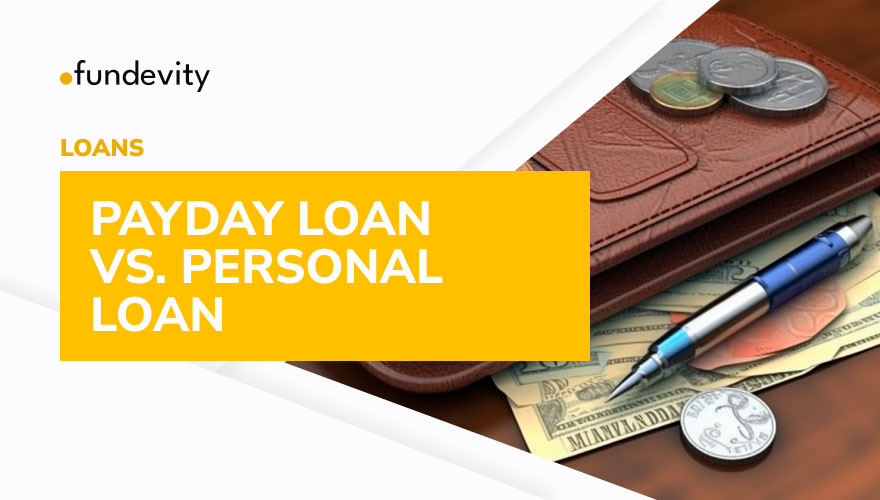Payday Loan vs Personal Loan: How Do They Differ?

Applying for a loan can help you pay for expenses that you might not be able to manage right now. You may borrow resources to recoup medical expenditures, house improvements, or even a trip, and there are various ways to do so.
A payday loan is one example. This form of loan is simple to obtain, but it is also quite hazardous. Payday loans have hefty interest rates and frequently come with hidden expenses. This turns it pretty simple to fall into a debt trap, where settling your loan turns quite tough, even if you only acquired a modest sum to begin with.
Personal loans are another option. These loans are a little more difficult to apply for than payday loans, but they have substantially lower interest rates. Personal loans are frequently used to consolidate debt and are a far safer option to obtain credit as a result.
How Does a Payday Loan Work?
This is the type of loan you should choose if you are in a brief cash constraint and need to borrow a small amount that you will be able to repay easily within a short period of time. Payday loans are short-term loans at a higher interest rate that can help you get through a financial emergency until your next paycheck arrives.
As a result, they are a convenient way to borrow money for little needs such as paying your rent, auto repair, and other small bills until your next payday; but, they come at a significant cost. Despite the increased rates and fees, you get the loan amount promptly and with minimal documentation.
In order to apply for a payday loan, you must provide information such as your employment status, sources of income, monthly wages, and so on. If you meet the criteria, the loan amount is disbursed to you, and you are given a few weeks (usually 2-4 weeks) to repay the loan once your next paycheck arrives.
You may also be needed to produce a postdated check for the loan amount plus interest. The borrower has the option of repaying the loan on or before the due date, or rolling it over for another pay period. The borrower is charged an extra cost to roll it over.
While payday loans have grown in popularity because they do not damage credit scores and may be obtained for a small loan amount, it is important to remember that you must pay them back as soon as your next paycheck arrives. Never take out a loan for an amount you know you won’t be able to repay within a few weeks.
If you don’t pay back the loan on time, lenders normally provide you more time with higher fees, after which you risk being deemed a defaulter and getting trapped in a debt cycle.
How Does a Personal Loan Work?
This is the type of loan you should take out if you need a substantial sum of money to make a large purchase, go on vacation, or arrange your wedding. A personal loan allows you to borrow a big amount of money to suit your needs, has a reduced interest rate, and can be repaid over months or years.
Banks and lenders, unlike payday lenders, will often analyze your credit history before approving your loan request. This implies that if you’ve previously taken out a loan and paid it back on time, your application is more likely to be granted, and you’ll be able to borrow a larger amount.
Payday Loan vs. Personal Loan: Key Differences
When it comes to meeting emergency costs, there are a few important differences between payday loans and personal loans:
| Payday Loan | Personal Loan | |
| Loan Amount | $1,000 to $50,000 | Up to $500 |
| Loan Term | Three to seven years | Two to four weeks |
| Interest Rate | 6% to 36% APR | Around 400% APR |
| Loan Application | Banks, credit unions or online lenders | Payday lenders |
| Credit Check | Yes | No |
| Loan Repayment Period | Installments on a monthly basis | Next paycheck |
Payday Loan or Personal Loan?
Payday loans and personal loans are both designed to assist you in various life situations. They are short-term loans that can be used to fulfill an urgent necessity such as a mortgage, auto repair, or other expenses in the middle of the month.
This form of loan does not require a good credit score and can be accepted quickly if you have a regular source of income and can reimburse the loan within a month, or on the day of your next paycheck. As a result, consider lesser unplanned bills that may be settled promptly.
A personal loan, on the other hand, is available if you require a substantial sum of money for any reason, such as acquiring a car or jewelry, traveling, purchasing electronic equipment, or organizing your wedding. You must offer proof of work and income and agree to repay the amount over a long period of time to qualify for a low-interest personal loan.
You must pay a set of quantity each month for the length of time you specify. As a result, you may consider taking out a personal loan to cover larger expenses such as life milestones, festivals, celebrations, and emergencies.
You can pick between the two depending on the amount you require, how quickly you require it, the interest rate you are ready to pay, and the time period over which you must repay it. Taking out a loan is a huge step that will have a big impact on your finances. As a result, you must be well-versed in the type of loan you take out, as well as the benefits and drawbacks.


